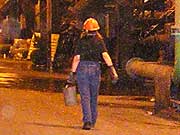| Women in the mines |
 |
| Julie Varichak, right, with a coworker at the Hibbing taconite mine in northern Minnesota. They are among a handful of women who work at the mine, alongside hundreds of men. (MPR Photo/Stephanie Hemphill) |
Hibbing, Minn. — It's Wednesday, and a small plane is circling over the Hibbing Taconite mine. The pilot makes several passes, talking by radio to a crew on the ground. He tells them it's all clear. All the drills and shovels and trucks and people are out of range.
Julie Varichak stands on a gravel road above the mine pit, wearing jeans, boots, and safety glasses. Under her hard hat, her brown hair is pulled back into a pony tail. She listens on her radio as men stationed in different parts of the pit repeat the refrain -- all clear, all clear, all clear.
Varichak looks intently at a spot in the floor of the pit, perhaps a half mile away. Suddenly, plumes of smoke and dirt erupt in a neat pattern across the ground.
The road under Varichak's feet vibrates, an unsettling massage through her thick boots. Then the sound comes. Rat-tat-tat like a machine gun, with a boom like cannons beneath. The deep crash echoes against the walls of the pit, as the clouds of smoke and dirt coalesce and drift toward Varichak and others watching from the road.
Varichak grins like a kid on a new bike. The blast went off without a hitch. Now she'll have new samples of ore to analyze.
Varichak is a mining engineer. She knows not all taconite is the same. Different layers of rock produce different grades of ore.
"There's a grade that the concentrator responds particularly well to," she says, "but we mix it in with slightly lower-grade material in order to sustain a longer life of the mine."
Varichak decides where the shovels should dig to get the right mix.
In her office, she takes off her hard hat. A bumper sticker tacked to the bulletin board says, "Strip mining prevents forest fires."
Varichak loves the outdoors. She camps and hikes and putts around on a pontoon boat. But she's also comfortable with the environmental disruptions of mining. To get to the ore, a machine must bulldoze the top layer of the earth away.
For Varichak, it's just part of the cost of providing the iron and steel that people need, for homes and cars and everything else in modern life. She says she wants people to learn about the positive aspects of mining.
"It helps the economy, it helps the environment, it helps the country as a whole," she says.
Varichak is working with other mines and local political leaders to design new ways of shaping and reforesting the mountains of waste material. She says when a mine is no longer producing ore, it can be turned into spectacular lakeshore property. Like most people who work in the mines, Varichak is proud of what she does. But she's far from a typical worker here.
For one thing, nearly all the other workers are men. Varichak and the handful of other women who work at the plant get together once a month.
"Some are from the older generation that was here right when Hibtac started," she says. "And they always say, 'Well, back when we started it was like this.' It wasn't that bad for them -- not as bad as it must have been at Evtac -- but they tell stories of things that would never fly now."
Evtac is Eveleth Taconite, where 21 women sued the company for sexual harassment in the 1980s.
Varichak says she's never had a problem with coworkers harassing her because she's a woman. She says she's had to prove herself not because she's female, but because she's young.
She graduated from high school with the children of many of her coworkers. But she says those older workers have been good to her -- "almost fatherly," she says.
"They helped me along and taught me a ton of things about mining," she says.
As those old-timers are retiring, Varichak says the mines will have trouble finding enough qualified people to take over. She says not enough young people are interested in working in the mines.
She plans to visit local schools to urge more students to consider a career in mining. Part of her message will be that the mines are modern, high-tech workplaces, and places that welcome women as well as men.
"We've proved ourselves," she says. "There's no reason that we can't do the same things that the guys do. Granted, we're not here in the numbers the men are, but we hold our own. We get the respect we earn. And we're ever-increasing."







